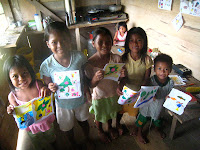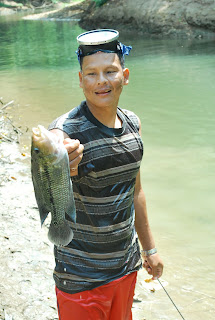I love the kids in my community. They are fun, respectful, and best of all...amazed by everything I do!
My kids have been a huge factor in my understanding of Emberá culture and the development issues of Alto Playón. Early on, the best way to become friendly with the parents was through their kids. However, I found that playing and getting to know the kids helps me understand their parents, just as much as talking to them.
For example, I go fishing with the kids. They are great fishers and spear fishers! It's in their genes and they learn from their parents. When they grow up they are masters at fishing, hunting, and farming because of everything that they have learned in their youth.
Similarly, growing up as a farmer in a rural community in the Comarca leaves you with a different interpretation of society. I grew up in a different system than these kids, one with roads, stores, schools, public health, law enforcement. For all these reasons, I can understand concepts like organization and groups, more so than the kids can when they grow up.
Furthermore, water and sanitation behavior is also intrenched from the start. Changing a lifestyle is a huge responsibility that shouldn't be taken lightly. At no point would I want to come into my community and tell my community members what their needs are. It's my responsibility, and more sustainable, to make sure that this is something they want and then proceed. That's why Community Integration and Health Promotion have been the cornerstone of my service.
The challenge of the Peace Corps' Capacity Building approach is working with a way of life that has existed for a long time since before you got there. Spending time with the kids in my community has helped to give me an idea of life in the community. It allows me to ask questions about what the implications for the future about the change I'm trying to make. Understanding the kids is the best way to make development work in the community...and have fun at the same time.












